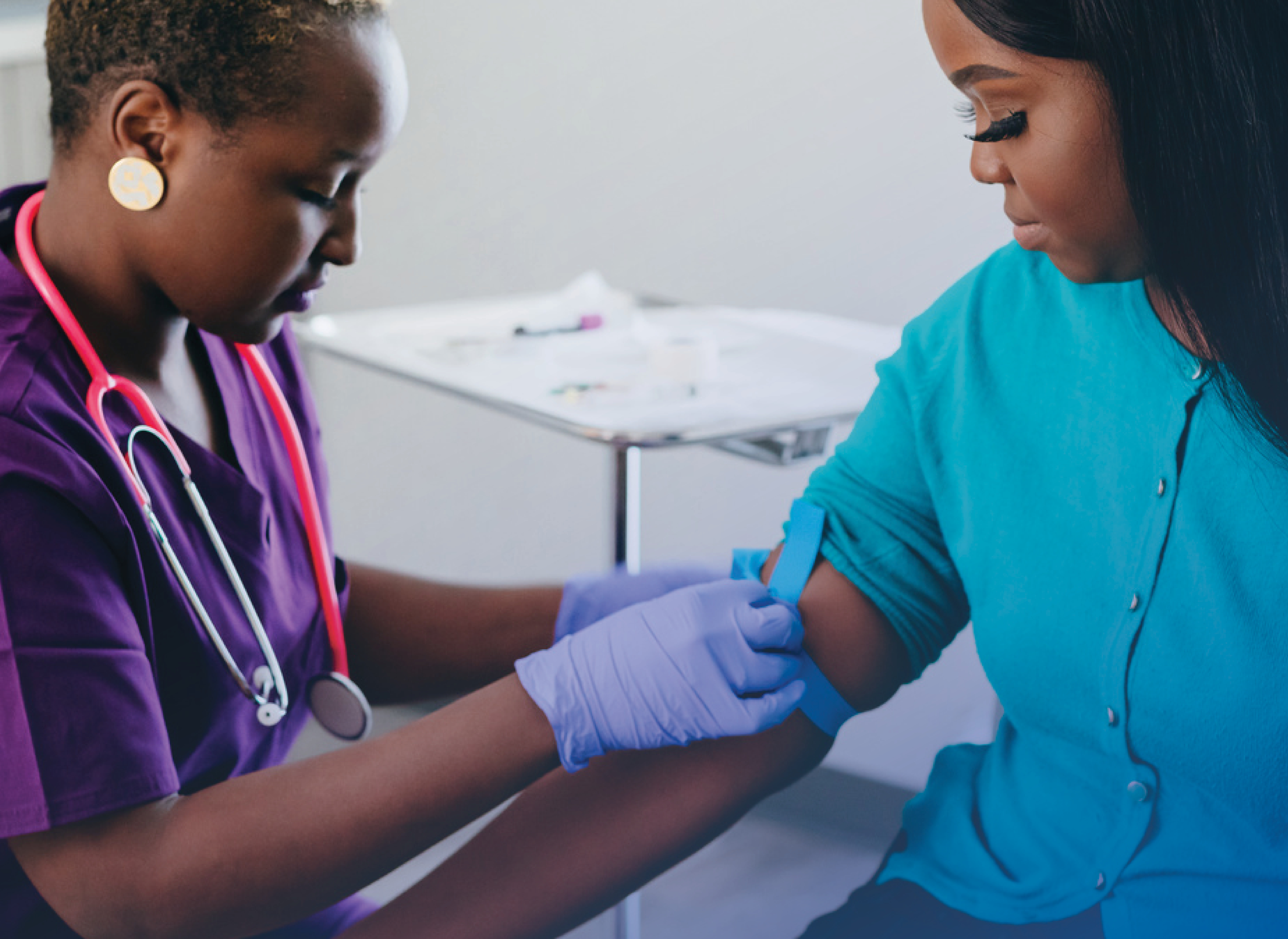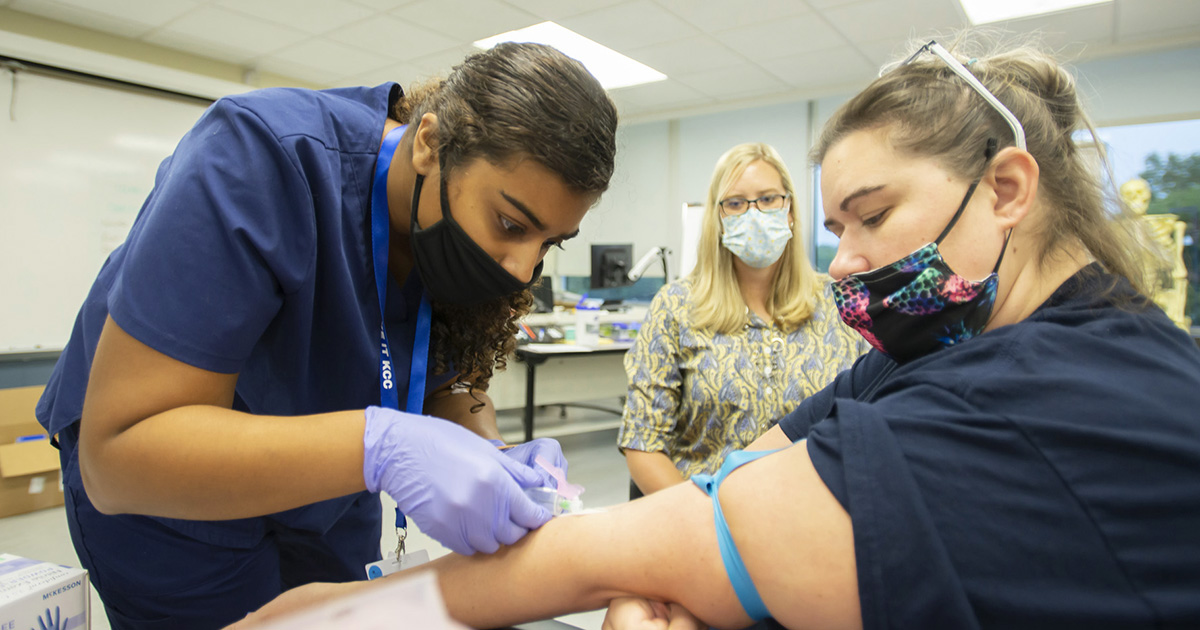Phlebotomy school FAQs: Your Common Questions Answered
Phlebotomy school FAQs: Your Common Questions Answered
Blog Article
The Course to Accreditation: Understanding the Phlebotomy Training Training Course Trip and Its Significance
As you take into consideration the path to accreditation in phlebotomy, it is very important to comprehend the role you'll play in medical care. Your training will certainly cover important skills, from blood collection methods to patient interaction. Each component of the program prepares you for the obstacles in advance. Yet exactly what does the journey require, and why is qualification so crucial for your future career? Let's check out these inquiries additionally.

The Role of Phlebotomists in Healthcare
Phlebotomists play a vital duty in the medical care system, functioning as the crucial link between individuals and vital analysis testing. You'll execute blood draws, making sure samples are gathered properly and safely. Your proficiency assists in detecting medical problems, keeping an eye on health and wellness, and guiding therapy choices.
In your everyday interactions, you'll require to develop trust with people, making them really feel comfy during what may be a stressful experience. You are accountable for classifying and handling examples carefully to avoid contamination or errors, which can influence examination results.
Past this, you'll often work alongside doctors and nurses, communicating critical info about people' problems. Your duty is fundamental in keeping the workflow in healthcare settings, making sure timely and exact results. By understanding your abilities, you contribute meaningfully to person care, making you a vital component of the medical team. Embracing this duty is essential to your success as a phlebotomist.
Summary of Phlebotomy Training Programs
When checking out phlebotomy training programs, you'll locate different types designed to fit various routines and learning styles. Each program aids you establish crucial skills like blood collection and patient interaction. Comprehending these alternatives is crucial to picking the ideal course for your career.
Kinds of Educating Programs
Several types of training programs are readily available for those looking to come to be efficient in phlebotomy. In addition, some healthcare facilities and centers provide on-the-job training programs, offering sensible experience while you learn. Whatever course you select, each program intends to furnish you with the essential skills for a successful phlebotomy career.

Secret Skills Developed
Grasping phlebotomy needs a collection of vital abilities that are developed through thorough training programs. You'll discover technological skills like appropriate vein option, needle insertion, and blood collection methods. These hands-on techniques ensure you can do procedures safely and efficiently. In addition, communication skills are essential; you'll require to communicate with individuals, clarify treatments, and placed them secure. Understanding anatomy and physiology is essential, as well, as it aids you locate veins and recognize the body's response to blood draws. You'll gain understanding of security methods and infection control, assuring you preserve a sterile setting. Each of these abilities is vital for your success as a licensed phlebotomist, making you a beneficial property in any type of medical care setting.
Trick Parts of a Phlebotomy Program
In a phlebotomy course, you'll concentrate on important topics that prepared for your future occupation. You'll take part in hands-on training that permits you to apply what you've learned in real-world setups. Both the curriculum and practical experience are vital for your success as a phlebotomist.
Core Curriculum Overview
While going after a phlebotomy training program, you'll run into a core educational program developed to outfit you with essential abilities and expertise. Phlebotomy Training Course. This curriculum normally consists of anatomy and physiology, concentrating on the circulatory system and comprehending blood parts. You'll likewise find out about different sorts of blood collection approaches, consisting of venipuncture and capillary slit strategies
In addition, infection control and safety procedures are essential parts, guaranteeing you recognize just how to keep a clean and sterile setting. You'll examine patient communication, stressing interaction and empathy, which are essential for reducing client stress and anxiety.
Hands-On Training Experience
Getting hands-on experience is an important component of your phlebotomy training course. This functional training permits you to apply what you have actually discovered in a real-world setting, improving your abilities and confidence. Phlebotomy Training Course.
In addition, you'll get the possibility to connect with individuals, which is vital for creating your interaction skills. This mix of technical effectiveness and interpersonal abilities is important for your success as a qualified phlebotomist. Inevitably, hands-on training is where concept meets practice, strengthening your expertise and preparedness for certification.
Qualification and Licensing Requirements
Before you can start your career in phlebotomy, it is vital to understand the accreditation and licensing needs that vary by state. Most states require phlebotomists to hold an accreditation from a recognized organization, such as the National Phlebotomy Organization or the American Society for Medical Pathology. These qualifications usually involve passing an examination that tests your knowledge and skills in the area.
Along with certification, some states have particular licensing needs. You might need to finish a particular variety of hours in scientific method, send evidence of training, or undergo a background check. It is vital to investigate your state's laws to ensure you meet all essential requirements.
Remaining educated concerning these needs not only helps you protect a setting yet also improves your reliability as an expert. By meeting these requirements, you'll be well on your means to a successful job in phlebotomy.
Hands-On Training and Practical Experience
Hands-on training and useful experience are important components of your phlebotomy education, as they allow you to use academic understanding in real-world scenarios. During your training, you'll engage in monitored venipuncture, discover correct methods, and become knowledgeable about various blood collection equipment. This direct involvement is important for building your confidence and sharpening your skills.
You'll work carefully with knowledgeable professionals who can lead you with the subtleties of client communication and sample handling. Each practice not only enhances your understanding however also prepares you for the busy setting my response of medical care settings.
In addition, several programs incorporate medical rotations, permitting you to experience varied setups, from healthcare facilities to outpatient facilities. This direct exposure aids you adapt to different challenges and client needs, ensuring you're well-prepared for your future function. Embrace these possibilities, as they're important to becoming a qualified and caring phlebotomist.
Difficulties Dealt With Throughout Training
While gaining hands-on experience is necessary, it's important to identify the difficulties that can occur throughout your phlebotomy training. Furthermore, grasping the skills needed for blood attracts takes method; you may have a hard time with strategy initially.
Time administration can additionally be a difficulty, as balancing theory, sensible sessions, and personal dedications can really feel intimidating. You may encounter varying discovering rates amongst your peers, resulting in feelings of self-doubt if you believe you're dropping behind. Ultimately, adapting to the different individualities of teachers can be challenging, as each may have an one-of-a-kind teaching design.
Acknowledging these obstacles early can prepare you for success and help you develop resilience throughout your training journey.
Job Opportunities After Qualification

As you acquire experience, you might also consider focusing on locations like pediatric or senior citizen phlebotomy, satisfying certain individual requirements. Some phlebotomists pick to advance their careers by becoming lab professionals or going after further education in medical care areas.
In addition, your accreditation can bring about functions in training or supervising brand-new phlebotomists, allowing you to share your understanding. With the health care industry constantly growing, your abilities will certainly constantly remain in need, paving the method for a stable and meeting profession. Embrace the possibilities awaiting you!
Frequently Asked Concerns
What Is the Normal Duration of a Phlebotomy Training Course?
Phlebotomy training programs try this website commonly last around 4 to 8 weeks. You'll participate in hands-on technique, class instruction, and on the internet learning. Completing this training prepares you for qualification and a rewarding job in health care.
Are Online Phlebotomy Courses Available?
Yes, on-line phlebotomy training courses are available. They offer adaptability and benefit, allowing you to study at your very own pace. Just validate the program is certified to fulfill qualification needs and obtain valuable abilities for your career.
How Much Does Phlebotomy Training Normally Price?
Phlebotomy training generally sets you back between $700 and $2,500, relying on the program and area. You must think about aspects like program length, included materials, and hands-on experience when selecting the appropriate training for you.
What Prevail Requirements for Phlebotomy Training?
Typical requirements for phlebotomy training usually include a secondary school diploma or GED, immunizations, and a history check. Some programs might likewise need fundamental health care knowledge or certifications, websites ensuring you're planned for hands-on training.
Can I Function While Completing My Phlebotomy Training?
Yes, you can function while finishing your phlebotomy training. Several trainees balance work with their studies, but make particular to manage your time efficiently to assure you satisfy both work and training commitments successfully.
Report this page